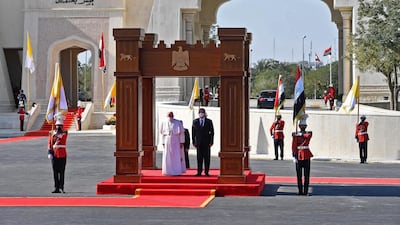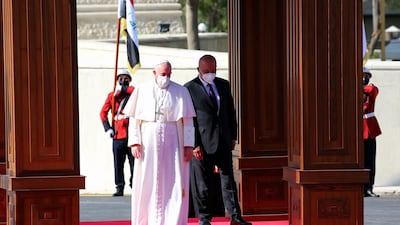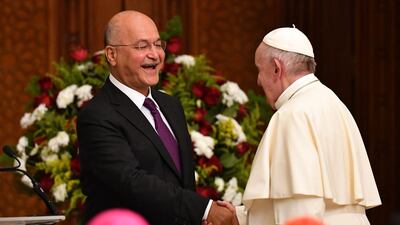On behalf of the ladies and gentlemen of our audience and on behalf of Iraqis with all their diversity and ancient identities, we welcome you Your Holiness.
It is our great pleasure to have you among us here in Iraq, in the land of Mesopotamia, in the land of the prophets and of heavenly religions
Welcome to Baghdad, the city of peace, and to other Iraqi cities, Najaf, Mosul, Erbil, Qaraqosh.
Welcome to Ur, our first city, which introduced writing and was the blessed birthplace of the Prophet Abraham (peace be upon him), the father of the prophets, the city that the hearts of believers yearn for.
Your unrelenting quest for peace, social justice and confronting poverty, and your tireless endeavours in the pursuit of dialogue, coexistence and human brotherhood, are a source of pride and appreciation, and your noble care for life and humanity are an inspiration to all.
Thank you for accepting our invitation and blessing us with your visit, the historical, religious and human significance of which we cannot but appreciate. It is a sign of the interest that you take in Iraq.
During our previous meetings in the Vatican, I felt how deeply Your Holiness cares about this country. I sensed the attention that you paid to, and the profound pain that you felt at, the tragedies that Iraqis have lived through, and the suffering they have experienced as a result of war, violence and external interference.
Iraqis feel pride at having such a generous and dear guest in their midst despite advice Your Holiness received to postpone the visit due to the exceptional circumstances that the world is experiencing as a result of Covid-19, and as a result of the difficult circumstances that our wounded country is facing. The decision to overcome these obstacles only makes Your Holiness's visit more precious in the hearts of Iraqis.
Despite the winds of violence, tyranny and totalitarianism that have swept through our land at episodes in its history, Iraqis take pride in the fact that they have lived in towns full of diversity, where Muslims, Christians, Jews, Sabaens and Yazidis live side by side, as brothers, in one settlement and one district. Churches neighboured mosques and husseiniyat, and the sound of ringing bells mixed with the call to prayer in the sky of Iraq.
Iraqis also take pride in the fact that they are protectors of the churches. After the terrorist attack on the Sayyidat Al Najat (Lady of Salvation) church, young Iraqi Muslims rushed to help their Christian brothers. In doing so, it was clear that Iraqi Muslims recognised as their national and humanitarian duty to defend the church just as they would their houses and holy places.
Similarly, one of the unforgettable images of the liberation of Mosul that will live long in our memories, and which the world was witness to, was the sight of a church that Daesh terrorists had damaged, where soldiers, faces and uniforms covered in the dust of combat, carried a cross on their shoulders to return it to its holy place in the liberated church. Their officer stood reverentially at attention, saluting the statues of Mary and Christ.
These profound humanitarian values are deeply rooted. They are a product of Iraqis' faith in the bonds of diversity and coexistence, which are as prized and well-established in their land as the palm trees that have taken root over thousands of years.
As the Muslim message spread in the early days of Islam, it was embraced by Christianity, and, when Muslims fled to Habash (the Horn of Africa), they were protected by Christians. It is said that the Christian Al Najashi (Negus) said to Muslim Jaafar that there is nothing between us apart from this line. And we remember the humanitarian words of Imam Ali (peace be upon him), in the early days of the Islamic state when he ruled from Iraq: "there are two types of people, either your brother in religion, or your equal in creation."
This is our inspirational history of peaceful coexistence, love, and brotherhood. And this is our present, built upon these high and noble values
Sadly, our world today lives in an era of division and polarisation. Parts of the world, especially in the East, have lost their sense of plurality, diversity, and acceptance of the view of others. This is caused by terrorism, incitement to violence and hate speech, and due to committing atrocities based on excuses that have nothing to do with the God's message. This is a threat to all of our futures.
Therefore, we must continue efforts to combat extremist thought, and stamp out the roots of terrorism. We need to ensure the victory of the ideas of coexistence and diversity that are the pride of our nations, and turn them into a source of strength and cohesion. For establishing these beliefs has become an imperative in our world today, and it is the most precious gift that we can give to the future of our generations to come.
For decades, our population was prey to senseless wars and repression that were unprecedented in history, during which time hundreds of thousands of Iraqis of all backgrounds were subject to execution, assassination and displacement. They faced the dictatorship's use of chemical weapons in Halabja, and campaigns of eradication with the Anfal in Kurdistan and the mass graves in the towns of central and southern Iraq. The marshes were drained, and the environment was horribly destroyed.
In the past two decades, Iraqis have lived through a most difficult war against terrorism, during which cities were destroyed, their economies devastated, and their residents forced to flee. Women were captured, churches were ruined, wells were set alight, and archaeological treasures were stolen. The worst violations were carried out against Yazidi and Turkmen women, and the most egregious massacres in Sinjar and Speicher. Muslims, Christians, Yazidi, Sabaeans, Kakaiyas and others were targeted.
We remember and honour the victims of tyranny and genocide. And we remember and honour martyrs who gave their lives for freedom from oppression and terror, in the service of the people of Iraq and, indeed, for wider humanity.
All of the Iraqi population was the victim of this misery. But we note especially the great suffering of our Christian brothers, who were forced to abandon their homes and their homeland. And this was but a part of the suffering of Christians in many countries in the Middle East.
Iraq been through the most challenging period. And ahead of us still are difficult challenges as we seek to fulfil the demands of our citizens for a fundamental reform of the system of government in our country, growth, social justice, job opportunities for our youth, guarantees of protection and freedoms, and bolstering the country's sovereignty.
Healing the great wound that Iraq has suffered demands care and attention from us to ensure that Iraq is a place for consensus and a bridge for communication and co-operation between the countries of the region, not a stage for conflict and rivalries of outside powers. It requires that Iraq be independent, with its sovereignty complete. It will render Iraq as the main pillar of a regional order based on respecting sovereignty, human rights, and economic co-operation.
There are in our region countries that are shedding blood and losing opportunities for development. Others are wasting resources. Everyone loses in this dark anarchy, and there is no solution apart from dialogue and mutual co-operation towards common security and the respect for rights of people.
The Christian of Iraq, the Christian of the East, are the indigenous people of this land and its salt. They stood side by side with their brothers from all different sects to confront the various challenges they have faced. Their historical, civilizational, and activist contributions have been deep-rooted and profound. They have been integral to building our societies, and helped craft our authentic eastern norms and traditions.
The Christians of the East have faced various crises in the past that have reduced their numbers and forced them to migrate. There is no doubt that the continued migration of Christians, along with that of other religious, ethnic groups, from the countries in the region will have dire consequences for the concepts of pluralism and tolerance. It will also have dire consequences for the ability of the countries of the region themselves to live together. For it is impossible to imagine the East without Christians.
The return of migrants, voluntarily – without coercion – is a requirement for healing our societies and moving beyond the tragedies of the past. That requires vigorous economic development efforts, restoring security everywhere, and whatever is needed to establish a national environment that will draw back our migrants and expatriates, foremost among them Christians and Yazidis.
Living conditions under Covid-19 have confirmed that the world is in need of peace and solidarity, not polarisation and division, if we are to harness our common abilities in the cause of serving life and the individual.
Today, His Holiness the Pope is a dear and welcome guest among us in Iraq. His visit is a historic opportunity and occasion to reaffirm the values of love, peace, coexistence, acceptance of others, and to support the diversity with which this land is blessed. We must take humanitarian initiatives, the echoes of which will spread across the world. There is an opportunity to cooperate and work together to achieve these humanitarian values.
We, the grandchildren of the Prophet Abraham (peace be upon him), the followers of the heavenly religions, Iraqis and others, cannot allow terrorism and extremism to be practiced in the name of religion. We cannot accept oppression. Iraq deserves better, and it deserves a bright future for its people.
Iraqis deserve more than they have at present. A country that God blessed with bounties and a prominent position, can be a bastion for security, stability and peace.
On the occasion of His Holiness's visit, I hope that the initiative to establish (the House of Abraham for Religious Dialogue) will be pursued. I also hope to create a permanent conference or seminar for dialogue, headed by representatives from the Vatican, Najaf, Al Azhar, Al Zeituna and other big religious centres that study joint and different histories in light of the holy code and the cuneiformist heritage.
Your Holiness the Pope
We are healing our wounds, and here your Holiness is with us helping us to dress them.
Thank you for this historic visit, which you undertake for the good of mankind
It is my honour to invite Your Holiness to address this audience, and from here to all Iraqis.


















